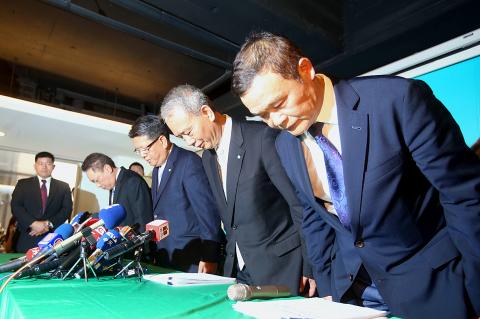Food manufacturer Ting Hsin International Group (頂新集團) yesterday apologized for its slow response in recalling 21 oil products it made using adulterated oil from Chang Chi Foodstuff Factory Co (大統長基).
Ting Hsin only recalled the 21 products — sold under the Wei Chuan (味全) brand — on Sunday, 19 days after Chang Chi’s oil was discovered to contain illicit substances.
“We will take full responsibility for the incident and spare no effort to protect our customers,” Ting Hsin chairman Wei Ying-chun (魏應充) said at a press conference.

Photo: CNA
Wei said he had not known that Chang Chi’s oil contained the illegal substance copper chlorophyllin until Chang Chi chairman Kao Cheng-li (高振利) confessed to prosecutors on Saturday.
Ting Hsin said the price of Chang Chi’s oil was not so unreasonably low as to arouse suspicion. The adulterated oil cost NT$93 per liter, which is only slightly lower than the average wholesale price of NT$95 to NT$100 per liter for imported oil, Ting Hsin said.
The company purchased the oil from Chang Chi instead of from manufacturers abroad because it only uses a relatively small quantity of 30 tonnes a year to make its products, it said.
Ting Hsin subsidiary Wei Chuan Foods Corp is to give NT$50 million (US$1.7 million) in refunds to customers who bought the 21 products, Wei said, adding that customers are eligible for a refund even if they do not have the receipts or have already opened the products.
Chang Mei-feng (常梅峰), the general manager of Ting Hsin’s oil division, has resigned to take responsibility for the issue and the group will set up an investigation team to determine who else should be held accountable, Wei said.
In addition, Wei said he has also resigned as chairman of the government-funded private organization that issues Good Manufacturing Practice certificates.
Wei Chuan bought 2.13 million kilograms of soybean oil from Chang Chi to make vegetable oil, but Wei Chuan president Chang Chiao-hua (張教華) said his company stopped using that oil in August.
Ting Hsin said the company also shipped the tainted oil to China’s Fujian Province so it informed Chinese dealers on Monday to pull the products from the shelves.
Wei Ying-heng (魏應行), who is also chairman of the group and Wei Ying-chun’s younger brother, said the oil used in Ting Hsin’s fried chicken fast-food chain Dicos (德克士) is palm oil imported from Malaysia, as is the oil used to make instant noodles under the group’s Master Kong (康師傅) brand and the oil in the sauce for its noodles.
The group did not take its products off the market immediately because two separate tests conducted after Oct. 16 showed that the oil it used did not contain copper chlorophyllin or gossypol, Wei Ying-heng said.

NATIONAL SECURITY THREAT: An official said that Guan Guan’s comments had gone beyond the threshold of free speech, as she advocated for the destruction of the ROC China-born media influencer Guan Guan’s (關關) residency permit has been revoked for repeatedly posting pro-China content that threatens national security, the National Immigration Agency said yesterday. Guan Guan has said many controversial things in her videos posted to Douyin (抖音), including “the red flag will soon be painted all over Taiwan” and “Taiwan is an inseparable part of China,” while expressing hope for expedited “reunification.” The agency received multiple reports alleging that Guan Guan had advocated for armed reunification last year. After investigating, the agency last month issued a notice requiring her to appear and account for her actions. Guan Guan appeared as required,

A strong cold air mass is expected to arrive tonight, bringing a change in weather and a drop in temperature, the Central Weather Administration (CWA) said. The coldest time would be early on Thursday morning, with temperatures in some areas dipping as low as 8°C, it said. Daytime highs yesterday were 22°C to 24°C in northern and eastern Taiwan, and about 25°C to 28°C in the central and southern regions, it said. However, nighttime lows would dip to about 15°C to 16°C in central and northern Taiwan as well as the northeast, and 17°C to 19°C elsewhere, it said. Tropical Storm Nokaen, currently

‘NATO-PLUS’: ‘Our strategic partners in the Indo-Pacific are facing increasing aggression by the Chinese Communist Party,’ US Representative Rob Wittman said The US House of Representatives on Monday released its version of the Consolidated Appropriations Act, which includes US$1.15 billion to support security cooperation with Taiwan. The omnibus act, covering US$1.2 trillion of spending, allocates US$1 billion for the Taiwan Security Cooperation Initiative, as well as US$150 million for the replacement of defense articles and reimbursement of defense services provided to Taiwan. The fund allocations were based on the US National Defense Authorization Act for fiscal 2026 that was passed by the US Congress last month and authorized up to US$1 billion to the US Defense Security Cooperation Agency in support of the

PAPERS, PLEASE: The gang exploited the high value of the passports, selling them at inflated prices to Chinese buyers, who would treat them as ‘invisibility cloaks’ The Yilan District Court has handed four members of a syndicate prison terms ranging from one year and two months to two years and two months for their involvement in a scheme to purchase Taiwanese passports and resell them abroad at a massive markup. A Chinese human smuggling syndicate purchased Taiwanese passports through local criminal networks, exploiting the passports’ visa-free travel privileges to turn a profit of more than 20 times the original price, the court said. Such criminal organizations enable people to impersonate Taiwanese when entering and exiting Taiwan and other countries, undermining social order and the credibility of the nation’s